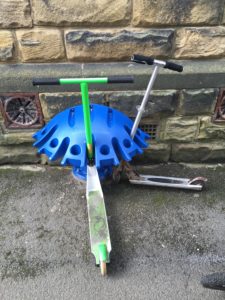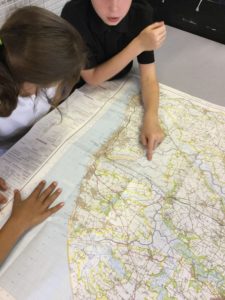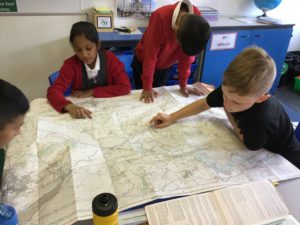Tuck shop returns
The KS2 fruit tuck shop returns tomorrow at playtime.
We’ve had a great response to our pre-payment option with 81 portions of fruit each week.
You can still pay on the day – 20p per portion.
PE, ‘relax and read’ and ‘show and tell’
Our PE day will be Wednesday. We will begin changing the children for PE from next week, 28 September. Please make sure your child’s PE kit is in school.
Relax and read will begin on Thursday 29 September. Please stay with your child on Thursday morning to read and choose a library book to take home.
Show and tell will be every Friday. Beginning Friday 30 September, the children can bring a small interesting item from home to show and talk about.
Thanks.
Wonderful website
A really thoughtful email arrived in our in-tray over the weekend…
Just want to say thank you for a great school website with lots of learning resources.
I came across your website when I was searching for spelling tests for my 5 year old daughter. I am very impressed with the extensive range of learning tools on your site. This will help me teach all my children.
I am from London and will be sharing your school website with my children’s school, hoping they can improve their current webpage.
Thanks once again and keep up the good work.
We’re happy that children, parents / carers and sometimes teachers benefit from using what’s on the website, whether they have a direct connection with our school or not.
‘Scoot the Route’ 26 – 30 September
Next week, we’ll be supporting Leeds City Council’s ‘Scoot the Route’ initiative to promote scooting to school to help reduce congestion at the school gates and encourage pupils to lead more healthy active lifestyles.
We will be running a competition throughout the week whereby children will be issued a ticket (below) at the gate if they come to school on their scooter. They need to complete the ticket and hand it in to the office. All tickets will then go in to a draw on Friday 30 September where children have the chance of winning one of five £10 Love2Shop vouchers.

Don’t forget you can park your scooter near the bike storage area using one of our new scooter storage pods.


It’s Gold again!
The School Games Mark is a Government led awards scheme launched in 2012 to reward schools for their commitment to the development of competition across their school and into the community. Schools in England are able to assess themselves across bronze, silver and gold levels of the mark based on participation in competitions, extra-curricular sporting activities, sports leadership and local club links.
Once again, we’re proud to receive a Gold award!
Thank you to all pupils, parents and staff who continue to have such enthusiasm for participation.


Maps!
This week, as part of our geography learning (Where in the world?) we learnt all about maps.
We thought about different types of maps and when we might use them. Then, we had chance to look at a range of OS maps for different regions around the UK. We learnt about contour lines, map symbols and identifying physical features. We also used a great online resource to aid our understanding (you can access this at home, too).
After lots of fun learning, then came the real challenge: learning how to fold our maps away correctly! I had agonised over how to teach this effectively but there was no need; turns out, Year 5 are much better at folding maps away than I am!


16 September 2016
| ‘ough’ words
We have been focusing on learning how to spell (and say) words containing the ‘ough’ letter string. Children should practise spelling these words in preparation for a test on Friday 23 September. On the back page of every child’s homework book there is a sheet full of effective techniques to learn spellings. Children should be using these methods to ensure they learn how to spell these words effectively: for life, not just the test. |
| bought |
| dough |
| nought |
| brought |
| rough |
| borough |
| enough |
| cough |
| although |
| thought |
16 September 2016
This week’s second homework is Mathletics and is due on Thursday 22 June.
You have been assigned two Mathletics tasks.
Children should log on to Mathletics and complete the tasks.
Once again, if you experience any problems logging on to Mathletics please come and see me. If the problem cannot be resolved, children will be given time on a Wednesday lunchtime to complete the activities
16 September 2016
This week’s homework is creative and is due on Thursday 22 September.
I can show what I know about the world we live in.
This serves as a reflection on our recent mini-topic, ‘Where in the world?‘ In class, we discussed several ways in which children could respond. They could:
- go for a walk using a map and make a short video-diary about how they used their map skills
- identify physical and human geographical features in the local area
- discuss Britain’s role in the world (we are small but influential… is that a good thing?)
- create a song to help people remember key facts like continents, oceans, countries, counties and capitals.
- make a weather report to show their knowledge of climates around the world
Plus many more. Last week, our homework was fantastic! Keep it up, Year 5!
16 September 2016
The homework this week is creative and is due in on Thursday 22 September.
Where in the world?
We’ve been learning about the world in our topic lessons for the past two weeks. We’ve used atlases, maps and globes to locate and name the different countries in the United Kingdom and the different continents and oceans of the world.
In this homework, you can reflect on this learning and create something which shows it off. Alternatively, you could teach the rest of the class about a place in the world which is special to you. It could be a place really far away or really close.